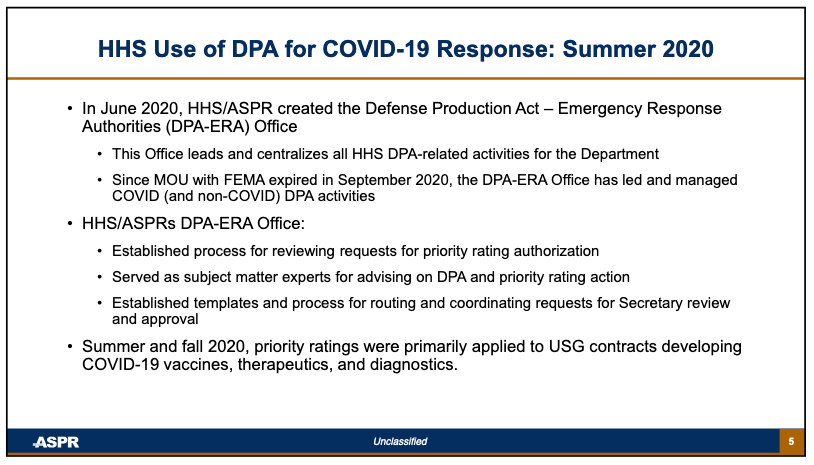Reader comment:
Karen Kingston just put up another piece about the contract and it's getting weird because it seems like we're talking about two different things entirely.
My reply, expanded:
I think the divergence lies in the difference between a pharmaceutical corporation operating as a private, commercial business, and a pharmaceutical corporation that has been folded into the government's national security complex through invoking of the Defense Production Act of 1950, PL 81-774, 64 Stat. 798.
Nov. 22, 2021 - Domestic Funding for COVID-19 Vaccines: An Overview, Congressional Research Service
Research and Development, Manufacture, and Purchase
COVID-19 vaccine R&D, manufacture, and purchase have been largely supported by a collaboration among several federal agencies, including the National Institutes of Health (NIH) and the Biomedical Advanced Research and Development Authority (BARDA) of HHS, and DOD— formerly Operation Warp Speed (OWS) and now the Countermeasures Acceleration Group (CAG).
Six vaccines were chosen for coordinated federal support under OWS. Some vaccine R&D has been supported by NIH, BARDA, and DOD separately from the OWS/CAG efforts.
NIH and DOD: FY2020 and FY2021 supplemental appropriations to NIH and DOD for COVID-19-related R&D can fund vaccine R&D. In the FY2020 and FY2021 supplemental appropriations acts, NIH received over$1.5 billion, available until September 30, 2024, broadly for COVID-19 related research.
The CARES Act (P.L. 116- 136) provided DOD with $415 million for COVID-19 medical R&D in the Defense Health Program account with some flexibility to reallocate other funds toward R&D.
BARDA and Other R&D, Manufacture, and Purchase:
In the FY2020 and FY2021 supplemental appropriations acts, over $50 billion in Public Health and Social Services Emergency Fund (PHSSEF) funding, available until September 30, 2024, is designated for a broad set of medical countermeasures and surge capacity purposes, including for the development, manufacture, and purchase of vaccines and related supplies.
The PHSSEF account funds BARDA, the main entity that has awarded large funding agreements to pharmaceutical companies for vaccine development, manufacture,and purchase.
Not less than $23.2 billion is set aside for BARDA in the FY2020 andFY2021 supplemental appropriations that can be used for vaccine-related efforts.
[American Rescue Plan Act, PL 117-2] further provides two relevant mandatory appropriations:
(1) in Section 2303, $6.05 billion, available until expended, to HHS for R&D, manufacturing, production, and purchase of vaccines and other medical products—available for COVID-19, SARS-CoV-2 or its variants, and any disease with potential for creating a pandemic; and
(2) in Section 3101, $10 billion, available until September 30, 2025, for activities under the Defense Production Act (DPA) for the purchase, production and distribution of medical supplies, including vaccines and related supplies, among others. Both of these ARPA appropriations have been assigned to HHS accounts—the first to PHSSEF and the second to a new HHSDPA [Health and Human Services Defense Production Act] account.
For more on the HHSDPA, see March 27, 2020 Executive Order 13911, Delegating Additional Authority Under the Defense Production Act With Respect to Health and Medical Resources To Respond to the Spread of COVID–19, and Department of Commerce Bureau of Industry and Security June 30, 2022 PowerPoint:
The pharmaceutical corporations have essentially turned into a branch of the federal government, whose agents have been granted sovereign immunities and set beyond ordinary judicial proceedings, short of treason, sedition and bioterrorism prosecutions.
I think Kingston's civil liability approach is very valuable for drawing that government-corporation merger or absorption process into clearer view and public understanding, in the same way that Brook Jackson's False Claims Act case provides opportunities to see it in action, through (so far) the Pfizer arguments April 22, 2022 at pp. 8, 11-13 and 25-26, and the US government's endorsement of that legal argument Oct. 4, 2022 at pp. 6-8.
Since the November 2021 CRS report quoted above, Congress in March 2022 appropriated billions more for the pharma-military kill programs, and they just appropriated billions more in the December 2022 Consolidated Appropriations Act for FY2023 and NDAA for FY2023. I found a few of the relevant provisions during a brief keyword search a few days ago but have not done a detailed review of these two Congressional acts yet.
UPDATE: Corey’s Digs published a full analysis of the two laws. Funding the Control Grid Part 1: The Biomedical Framework
2022/12/23 - NDAA for FY2023. PL 117-263. Section 5955: Global Health Security and International Pandemic Prevention, Preparedness and Response Act of 2022. Authorizes, expands and funds globalized military-health structure linking US military to global genocide apparatus operating under WHO frameworks.
2022/12/29 - Consolidated Appropriations Act for FY2023. PL 117-328. Many federal and state-level public health/martial law authorization and funding provisions included. H.R. 2617-419: “Public Health and Social Services Emergency Fund. For expenses necessary to support activities related to countering potential biological, nuclear, radiological, chemical, and cybersecurity threats to civilian populations, and for other public health emergencies, $1,647,569,000, of which $950,000,000…for expenses necessary to support advanced research and development…of the Biomedical Advanced Research and Development Authority.” H. R. 2617-420 - $1,500,000,000 for ARPA-H: Advanced Research Projects Agency for Health. Section 2235 at H.R. 2617-1297, One Health Framework: “coordination mechanism at the Federal level to strengthen One Health collaboration related to prevention, detection, control, and response for zoonotic diseases and related One Health work across the Federal Government.”







I get triggered by the continual use of the word "health" in all of this. None of it has anything remotely to do with health. Everything in the medical world is about intervention. Health is an individual responsibility and natural condition. "Healthcare plans" are insurance policies covering interventions. "Healthcare providers" are medical interventionists. Drugs, including vaccines, are medical interventions that may not support health at all, yet are sold as such. One Health is more like One Nightmare of technocratic, bureaucratic overreach. We don't need doctors or drugs to be healthy in most cases.
That one health was just rolled out bt Who..theyve been planning this for years then?